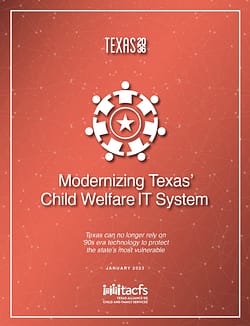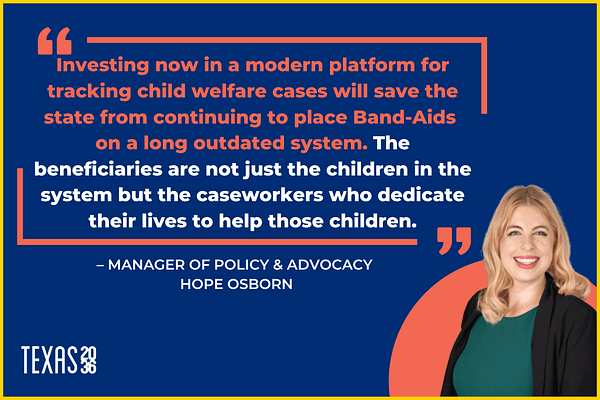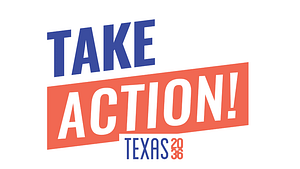It’s time to modernize Texas’ child welfare system: Newsletter
This is a preview of our Texas 2036 newsletter about our new report that outlines the need to modernize the child welfare IT data system. To receive this weekly highlight of our work, sign up here.

Modernizing Texas’ Child Welfare IT System 🌐
Setting the Stage: In 2020, three out of every 1,000 children in the U.S. were living in foster care. Of those 214,000 kids, more than 15,000 were in Texas.
- Texas children are living in various foster homes or facilities for an average of 18 months.
Who’s In Charge: The Texas Department of Family and Protective Services, an agency of about 12,500 as of 2022, oversees the foster care system, including Child Protective Services.
- Today, the average daily caseload for these frontline child welfare workers is 16.
👉 Read more: Breaking down the numbers for kids in foster and kinship care
Cause for Concern: DFPS currently uses ’90s era technology to track case file information, including instances of possible abuse and neglect, which does not meet federal guidelines from 1993.
- Texas is one of just four states that has not seized the opportunity to modernize its child welfare information system.
Time for Action: Last week, federal monitors released their 5th report about CPS that documented persistent risks to Texas children following an 11-year-long lawsuit. A U.S. District Judge also held a hearing to discuss what more needs to be done to protect children under the state’s care.
- With a historic budget surplus, the state is primed for additional investments into child welfare.
Under the Dome: Texas legislators are signaling a desire for real change within the foster care system.
- The Lieutenant Governor created the Senate Special Committee on Child Protective Services in March 2022, and the Speaker of the House started the Select Committee on Youth Health and Safety in September 2021.
 Making an Impact 🤛
Making an Impact 🤛
Digging into the Data: Texas 2036 and the Texas Alliance of Child and Family Services released a report this week calling for the state to update the child welfare information system.
- The state cannot continue to rely on old technology to protect Texas’ most vulnerable.
Room for Improvement: Modern platforms allow for greater interoperability between agencies and between staff, support continuous updates, and enable staff to access accurate and timely data by both computer and phone.
- IMPACT, the Information Management Protecting Adults and Children in Texas platform used by DFPS, fails to meet current federal guidance.
Money Talks: Beginning the process of converting to a modern child welfare information system would be an estimated biennium cost of $80 million. This represents 0.24% of the current estimated budget surplus revenue for this fiscal year.
- Since 2015, IMPACT has cost the state about $80 million in modernization efforts alone.
Fiscal Responsibility: The cost of conversion can be offset partially through unused federal funds and the newly created Technology Improvement and Modernization Fund, with the federal government providing a 50% match
👉 Dive deeper: Child welfare data system: Time for change

 Read the Report 💻
Read the Report 💻
“Modernizing Texas’ Child Welfare IT System” dives into three key topics:
- The history of the different types of child welfare systems
- Descriptions of interoperability and why it is important
- The investment needed to better serve Texas children and families in the system
Tracking Texas’ Progress 🪜
What’s in Motion: State agencies submitted their budgets last summer. Early proposals would allocate $4 billion to CPS’ work within DFPS.
- This budget does not include the $80 million that we have identified to upgrade the old technology being used today to track more than 50,000 children protected by the system yearly.
What’s Next: Weather permitting, next week the Senate Finance Committee will hear from DFPS’ new commissioner, Stephanie Muth.
- Since she assumed this role last month after the agencies’ legislative appropriation requests were submitted, she will be allowed to submit an updated version.
Texas 2036 Take: Manager of Policy and Advocacy Hope Osborn also will testify in support of a request for modernization of IT.
- This needed upgrade will help keep social workers in the field more, thus spending more time with children in foster care, and offering true mobility. With more real-time, accurate information, caseworkers can make better informed decisions.

 Do you support modernizing our child welfare system? 🧒🏻
Do you support modernizing our child welfare system? 🧒🏻
Show us you champion investing in Texas children at our Action Center!
